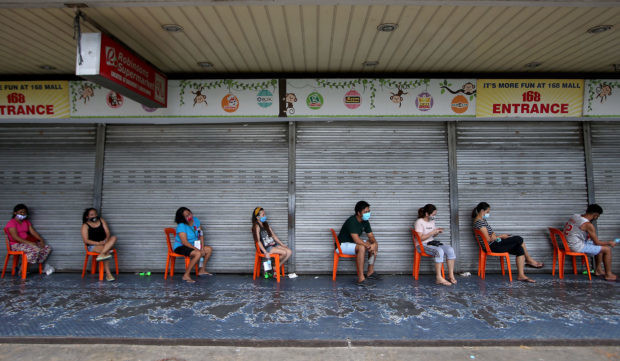
SLOWING THE SLOWDOWN Customers observing social distancing line up at the neighborhood supermarket. Not a few establishments since the lockdown have been offering online grocery purchases and take-out deliveries to somehow keep their businesses open. (Photo by RICHARD A. REYES / Philippine Daily Inquirer)
MANILA, Philippines — Even as the country grapples to contain the COVID-19 disease, the government is working to grasp what a “new normal” postpandemic would look like to keep the economy afloat, the country’s chief economist said on Sunday.
The economy, like those in many countries, is expected to slip into recession as a result of lockdowns in Luzon and other parts of the country that have shuttered many factories, malls, offices and many other businesses, causing people to lose jobs and livelihoods.
Socioeconomic Planning Secretary Ernesto M. Pernia said the Inter-Agency Task Force’s technical working group for anticipatory and forward planning, chaired by the National Economic and Development Authority (Neda), was crafting recommendations to rebuild confidence and adjust to the new normal.
“We are doing this even while the government accelerates the implementation of measures to slow down the spread of the COVID-19 virus,” Pernia said in a statement.
Neda, the state planning agency headed by Pernia, is in-charge of crafting an economic recovery plan.
Crowdsourcing
“As this pandemic affects various sectors, it is important for us to be able to characterize what this new normal would mean to each and every segment of the population. We are currently crowdsourcing for inputs on how the whole of government can address the challenges the country is facing,” he said.
He said the government would be ready to adjust plans and implement interventions as the air of uncertainty was expected to remain for some time. “We aim for these strategies to cover the most pressing issues and build from there with forward planning as our lens.”
Over the weekend, Neda and the Department of France (DOF) rolled out two surveys seeking to know how Filipinos were coping so far and how they would buy and sell goods, as well as avail themselves of and provide services once the new coronavirus threat lifted.
One survey that circulated on social media and was forwarded to members of business groups over the weekend included a “consumer rapid assessment.”
Another poll was intended for micro, small and medium enterprises (MSMEs).
Online surveys in 3 languages
The questionnaires were made available in English, Filipino and Bisaya.
Since the surveys are online, it is unclear how they could be answered by households and small businesses without internet access.
Results of the survey on entrepreneurs “will help President Rodrigo Duterte’s economic team forge an economic recovery plan, with a focus on helping MSMEs get back on their feet once the quarantine is lifted,” Finance Secretary Carlos G. Dominguez III said on Saturday.
“The survey will also help the government devise fiscal and monetary strategies tailored to the need of the business community, so government actions will keep the overall economy afloat,” Dominguez said.
American consultant
The three-part MSME survey, which is being conducted in partnership with the Boston Consulting Group (BCG), wants to “understand [respondents’] experience and needs as a micro/small/medium-sized business under an enhanced community quarantine (ECQ) brought about by the COVID-19 pandemic.”
The survey’s first part asks about the pandemic’s impact thus far on small businesses and their expectations as far as workforce deployment, clientele, cash flow, and operations are concerned.
In the second part, the MSMEs are asked if they have availed themselves of any financial or technical assistance from the government and if they need other forms of support to keep their businesses afloat.
The third culls information about a company, including to which industry it belongs, the number of full-time and contractual employees, its revenue and total assets last year, and its location.
Businesses are also asked to share their opinion about an extension of the one-month quarantine period in Luzon beyond April 12.
Household income, online learning
As for the consumer rapid assessment, individuals are asked about their household’s income and if it is enough; if they have difficulty buying goods and availing themselves of services during the quarantine; what they want to purchase in the future; and if they have received relief and what more do they need.
The consumer survey also tracks the conditions of vulnerable sectors, such as persons with disabilities, pregnant women and senior citizens.
Households with students staying at home are asked about their experiences on digital learning.
Pernia was hopeful that many consumers and firms would participate in the survey. “The higher the responses, the better,” he told the Inquirer on Saturday.
For the survey of consumers, the deadline is “tight”—at noon of April 7. Deadline for the MSME survey is even tighter—April 5.
Pernia said Neda would crunch and assess the survey results “as soon as data came in.”
Economic agencies are expected to submit progress reports on April 7 and their final report on April 13. —WITH REPORTS FROM VINCENT CABREZA AND KIMBERLIE QUITASOL INQ